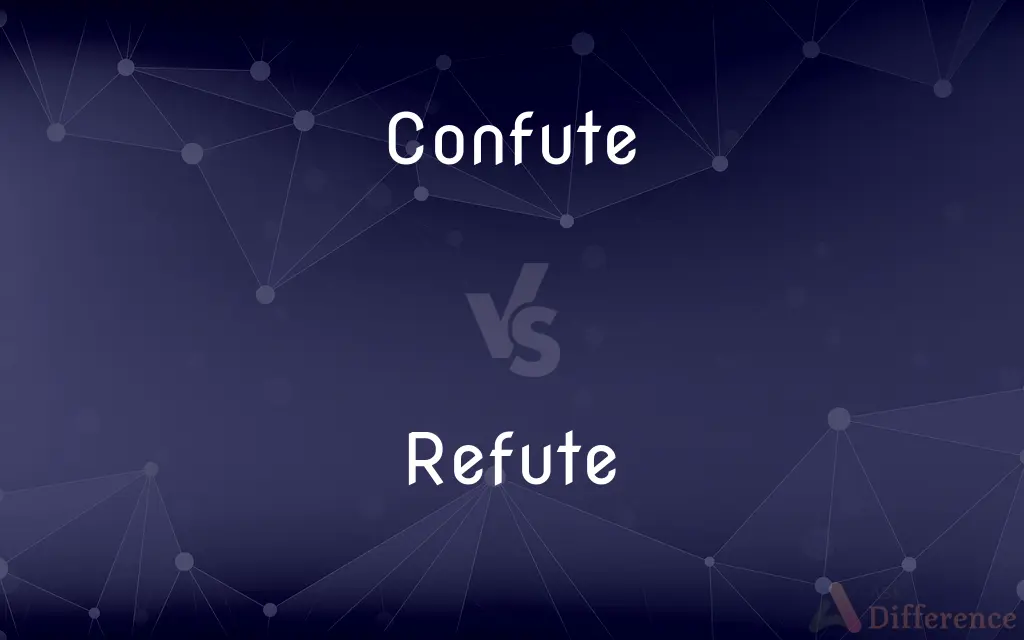Confute vs. Refute — What's the Difference?
By Fiza Rafique & Urooj Arif — Updated on March 12, 2024
Confute implies proving wrong with evidence, while refute involves disproving or denying.

Difference Between Confute and Refute
Table of Contents
ADVERTISEMENT
Key Differences
Confute is a term used to describe the act of proving someone or something to be wrong or false, often through evidence or argument. It typically involves a direct confrontation of the opposing argument with the intent to show its falsehood. Refute, on the other hand, carries a similar meaning but is more commonly used in the context of disproving or denying the validity of an argument, allegation, or claim, potentially with less emphasis on the presentation of counter-evidence.
When someone confutes an argument, they not only deny its validity but also present clear and compelling evidence or reasoning to demonstrate its errors or falsehoods. This action is often seen in debates and academic discussions, where factual accuracy and logical consistency are paramount. In contrast, to refute an argument might not always involve presenting detailed counter-evidence; it could also entail pointing out logical fallacies, inconsistencies, or providing a general denial.
The use of confute tends to suggest a stronger emphasis on the dismantling of an argument's foundation through detailed evidence and analysis. It implies a thorough debunking of the opposing viewpoint. Refute, while also implying a form of disproval, can be used in broader contexts and might not always suggest as detailed or comprehensive a dismantling of the opposing argument.
Confutation, the noun form of confute, implies a process or act of proving a statement or theory to be wrong, often in a detailed and methodical manner. Refutation, the noun form of refute, denotes the act of proving something to be wrong or false, and it is widely used in academic, legal, and intellectual discourse.
The choice between confute and refute can depend on the context and the desired connotation. In academic writing or formal debates, confute might be used to denote a more rigorous and evidence-based disproof, whereas refute might be employed in a broader range of contexts, from casual discussions to formal arguments, to indicate a denial or disproof of a claim.
ADVERTISEMENT
Comparison Chart
Definition
Proving something wrong or false with evidence
Disproving or denying the validity of an argument
Connotation
Strong emphasis on evidence and detailed argumentation
Broader, may not always involve detailed counter-evidence
Usage Context
Debates, academic discussions
General argumentation, across various contexts
Implied Action
Detailed dismantling of an argument
Denial or disproval, not always detailed
Emphasis
On the presentation of counter-evidence
On the act of denying or disproving
Compare with Definitions
Confute
To prove wrong with strong evidence.
The scientist confuted the outdated theory with new research findings.
Refute
To deny or disprove the validity of a claim.
The journalist refuted the false claims made in the article.
Confute
Emphasizes detailed argumentation.
The attorney confuted the allegations with a well-constructed defense.
Refute
Can be used in a wider range of contexts.
The teacher refuted the student's incorrect answer.
Confute
Often used in formal or academic contexts.
The paper confuted previous assumptions about climate change.
Refute
Not always detailed in disproval.
He quickly refuted the baseless accusation.
Confute
Involves thorough debunking.
The debate team confuted their opponents' arguments effectively.
Refute
Can imply a general denial.
The company refuted allegations of misconduct.
Confute
Suggests a comprehensive disproof.
Her presentation confuted the common misconceptions about vaccinations.
Refute
Common in everyday argumentation.
She refuted the rumor about her promptly.
Confute
To prove to be wrong or in error; refute decisively.
Refute
The defence called several respectable witnesses who were able to refute the false testimony.
Confute
(Obsolete) To confound.
Refute
Prove (a statement or theory) to be wrong or false; disprove
These claims have not been convincingly refuted
Confute
To show (something or someone) to be false or wrong; to disprove or refute.
Refute
To prove to be false or erroneous; overthrow by argument or proof
Refute testimony.
Confute
To overwhelm by argument; to refute conclusively; to prove or show to be false or defective; to overcome; to silence.
Satan stood . . . confuted and convincedOf his weak arguing fallacious drift.
No man's error can be confuted who doth not . . . grant some true principle that contradicts his error.
I confute a good profession with a bad conversation.
Refute
To deny the accuracy or truth of
Refuted the results of the poll.
Confute
Prove to be false;
The physicist disproved his colleagues' theories
Refute
Usage Problem To repudiate.
Refute
(transitive) To prove (something) to be false or incorrect.
Refute
To deny the truth or correctness of (something).
Refute
To disprove and overthrow by argument, evidence, or countervailing proof; to prove to be false or erroneous; to confute; as, to refute arguments; to refute testimony; to refute opinions or theories; to refute a disputant.
There were so many witnesses in these two miracles that it is impossible to refute such multitudes.
Refute
Overthrow by argument, evidence, or proof;
The speaker refuted his opponent's arguments
Refute
Prove to be false or incorrect
Common Curiosities
How does refute differ from confute?
Refute involves disproving or denying a claim, and while it can involve evidence, it does not always emphasize as detailed a disproof as confute does.
Can refute be used without providing evidence?
Yes, refute can be used to simply deny the validity of a claim without necessarily providing detailed counter-evidence.
What is a refutation?
A refutation is the act of proving something to be wrong or false, typically an argument, statement, or theory.
Can someone confute a widely accepted theory?
Yes, someone can confute a widely accepted theory if they provide compelling and conclusive evidence against it.
What does it mean to confute an argument?
To confute an argument means to prove it wrong or false, often through detailed evidence and argumentation.
How important is clarity in the process of confuting?
Clarity is very important in confuting, as it ensures that the evidence and reasoning presented are easily understood and persuasive.
What role does evidence play in confutation?
Evidence is crucial in confutation, as it forms the basis for proving the opposing argument wrong or false.
Is confute used more in formal contexts?
Confute is often used in more formal or academic contexts, where thorough evidence and argumentation are important.
How do you refute an argument in a debate?
In a debate, you can refute an argument by pointing out logical fallacies, inconsistencies, or by presenting counter-evidence.
Can confuting an argument strengthen your position?
Yes, confuting an argument effectively can significantly strengthen your position by demonstrating the robustness of your evidence and reasoning.
Is it necessary to use confute in academic writing?
While not necessary, confute can be used in academic writing to emphasize a rigorous and evidence-based disproof of a claim.
Can a theory be refuted but still widely accepted?
A theory can be refuted in certain aspects but might remain widely accepted until there is overwhelming evidence against it.
Is it easier to refute or confute an argument?
It may be easier to refute an argument by simply denying its validity, while confuting usually requires more detailed evidence and thorough argumentation.
Is refutation a common practice in legal contexts?
Yes, refutation is a common practice in legal contexts, where parties often seek to disprove the claims or evidence presented by the opposition.
Can personal opinions refute facts?
Personal opinions cannot refute facts; refutation requires objective evidence or logical argumentation.
Share Your Discovery

Previous Comparison
Check vs. Control
Next Comparison
Colour vs. CreedAuthor Spotlight
Written by
Fiza RafiqueFiza Rafique is a skilled content writer at AskDifference.com, where she meticulously refines and enhances written pieces. Drawing from her vast editorial expertise, Fiza ensures clarity, accuracy, and precision in every article. Passionate about language, she continually seeks to elevate the quality of content for readers worldwide.
Co-written by
Urooj ArifUrooj is a skilled content writer at Ask Difference, known for her exceptional ability to simplify complex topics into engaging and informative content. With a passion for research and a flair for clear, concise writing, she consistently delivers articles that resonate with our diverse audience.
















































